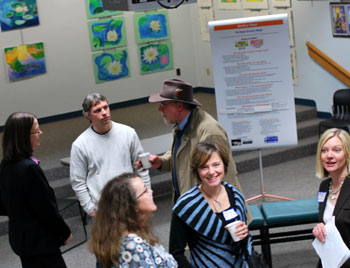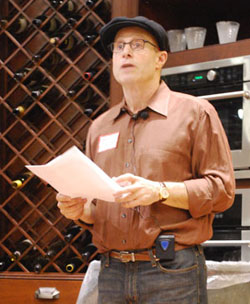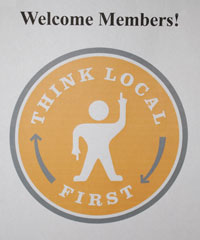Local Currency for Washtenaw County?
At the October 2009 meeting of the Ann Arbor Downtown Development Authority board, Sandi Smith reported out from the partnerships committee that a $6,000 grant had been awarded to Think Local First. The grant was awarded in regular U.S. dollars. But it’s a local currency that those federal dollars are helping to explore – by paying for a study to see if a local currency is feasible in Washtenaw County.

Backround trio from left to right: Kathy Ciesinski with Think Local First; Andrew Cluley, who was covering the event for WEMU radio; and Bob Van Bemmelen, proponent of the Unity model. Foreground trio: Ingrid Ault, executive director of Think Local First; Samantha Nielsen Misiak and Krissa Rumsey, both facilitators for TLF. (Photos by the writer.)
On Tuesday evening at the downtown Ann Arbor District Library’s lower level multipurpose room, Think Local First held the first of three meetings designed to gauge interest and support for the idea of a local currency. Ingrid Ault, Think Local First’s executive director, said she was hoping that more than the 10 people who dropped by would attend.
But there’ll be two additional meetings with the same content, both from 6-8 p.m.: Thurs., Feb. 25 at the Ypsilanti Senior Center; and Wed., March 3 at Vitosha Guest Haus Inn.
One couple, Larry An and Eileen Ho, dropped by the Tuesday event, even though that wasn’t the reason they were visiting the library. They’d come with their fourth- and six-grade kids, who were looking for their artwork – the lower level of the library is regularly updated with exhibits of art created by students in Ann Arbor’s local schools. [Full Story]






